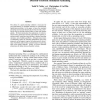Free Online Productivity Tools
i2Speak
i2Symbol
i2OCR
iTex2Img
iWeb2Print
iWeb2Shot
i2Type
iPdf2Split
iPdf2Merge
i2Bopomofo
i2Arabic
i2Style
i2Image
i2PDF
iLatex2Rtf
Sci2ools
129
click to vote
FLAIRS
2010
2010
Decision-Theoretic Simulated Annealing
The choice of a good annealing schedule is necessary for good performance of simulated annealing for combinatorial optimization problems. In this paper, we pose the simulated annealing task decision-theoretically for the first time, allowing the user to explicitly define utilities of time and solution quality. We then demonstrate the application of reinforcement learning techniques towards approximately optimal annealing control, using traveling salesman, clustered traveling salesman, and scheduling problems. Although many means of automating control of annealing temperatures have been proposed, our techniques requires no domain-specific knowledge of problems and provides a natural means of expressing time versus quality tradeoffs. Finally, we discuss alternate ions for future decision-theoretic variants.
Artificial Intelligence | FLAIRS 2010 | Optimal Annealing Control | Simulated Annealing | Simulated Annealing Task |
Related Content
| Added | 11 Feb 2011 |
| Updated | 11 Feb 2011 |
| Type | Journal |
| Year | 2010 |
| Where | FLAIRS |
| Authors | Todd W. Neller, Christopher J. La Pilla |
Comments (0)

